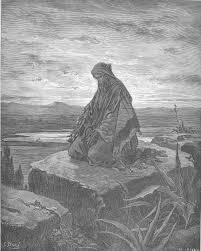Isaiah 64: 4-9, Filthy Rags
 The statement, “All our righteousness is like filthy rags”, is found in the middle of a Biblical poem in Isaiah (Isaiah 64:4-9).
The statement, “All our righteousness is like filthy rags”, is found in the middle of a Biblical poem in Isaiah (Isaiah 64:4-9).
The kingdom is upheld with righteousness
A theme in the Hebrew Bible in the Book of Isaiah is the promise of the coming Messiah , and one of his marks is righteousness. “Behold I lay in Zion a stone… and I will make justice the measuring line, and righteousness the level” (Isaiah 28:16-17). Righteousness is the measure used to lay the very foundation of God’s kingdom.
“A child will be born to us, a son will be given to us, and the government will rest on his shoulders… on the throne of David and over his kingdom, to establish it and uphold it with justice and righteousness…” (Isaiah 9:6-7,see 59:17).
God calls us to do good
Another recurring feature of Isaiah is the pleading of the Lord for his people to give up their evil and turn back to righteous living. The Lord says, “Wash yourselves, make yourselves clean, take away from before my eyes the evil of your deeds. Cease to do evil, learn to do good” (Isaiah 1:16-17). The passage goes on to say that if the people do this willingly and obediently, they will be rewarded and blessed (Isaiah 1:18-20).
Here’s another example: “Thus says the Lord, Preserve justice and do righteousness… How blessed is the man who does this…” (Isaiah 56:1-2).
God values righteous deeds
God names some of the deeds he delights in: “…to share your bread with the hungry, and bring the homeless poor into your house, when you see the naked to clothe him…” (Isaiah 58:7). That’s doing what God values, not what God despises as filthy rags.
In contrast, in the New Testament, the Lord’s response is positive to a humble and upright person, zealous for the way of the Lord. God has covenanted through Jesus that “sin shall be taken away” (Isaiah 27:9). When God by his grace, and by the virtue of Jesus and his sacrifice, bestows his gift of forgiveness on those who obey him, then God has made them righteous. They should not then say, “All our righteousness is like filthy rags” but rather “I am honoured in the sight of the Lord and God is my strength” (Isaiah 49:5).
But Judah’s righteousness was like filthy rags
The first chapter of Isaiah in the Hebrew Bible clarifies God’s reason for rejecting as filthy rags the righteousness of his people in Judah and Jerusalem. They were “alas a sinful nation” and a rebellious people (Isaiah 1:4-5). They are likened to Sodom and Gomorrah (Isaiah 1:10-11). Yet they offered to God multiplied sacrifices and prayers (Isaiah 1:11-15). “How the faithful city has become a harlot, she who was full of justice! Righteousness once lodged in her”(Isaiah 1:21).
God once was delighted with the people, but now he is disappointed. They have become two-faced. Whilst they continued to worship, they also continued to do evil. The Lord repudiated their false righteousness as filthy rags —or as he puts it in another metaphor here, “Your silver has become dross” (Isaiah 1:22).



